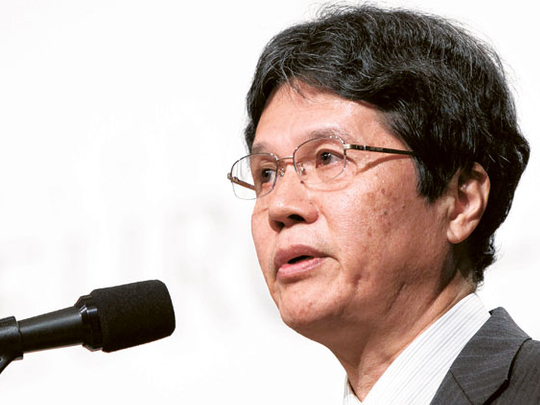
Denver: Bank of Japan Deputy Governor Kiyohiko Nishimura said the central bank must avoid giving the impression that it is monetising that country's debt.
While implementing its asset purchase programme, the bank should focus on "avoiding causing problems in national debt management," Nishimura said Friday in Denver. He spoke at a panel discussion at a conference organised by the Allied Social Science Associations.
"Specifically, it is crucial to avoid creating an impression of the monetisation of government debt," he said.
"Otherwise, purchases may lead to a substantial and lasting ratcheting-up of long-term rates which would pose a serious problem for economic recovery and the financial position of the government."
The Bank of Japan in October unveiled a five trillion yen (Dh220.7 billion) fund to buy assets including government bonds, corporate debt, exchange-traded funds and real estate investment trusts.
BOJ Governor Masaaki Shirakawa has said the bank is ready to increase the fund's asset purchases should the economy deteriorate and more monetary stimulus become needed.
Vicious circle
"The asset purchase programme is also aimed at breaking the vicious circle in capital markets caused by risk aversion," Nishimura, 57, told the panel.
"The purchases are designed to act as a catalyst to induce investment in riskier assets," he said.
Government data released last month indicated Japan's economic rebound was sustained, as industrial production rose for the first time in six months in November, retail sales increased more than forecast and the jobless rate held steady at 5.1 per cent.
The government forecast on December 22 that economic growth would slow to 1.5 per cent in the year starting April 1, from a projected 3.1 per cent this year.
The BoJ has kept the key interest rate between zero per cent and 0.1 per cent since October and has pledged to maintain "virtually zero rates" until it can expect consumer prices to show stable gains.
Deflation continues in Japan, with consumer prices excluding fresh food falling for the 21st straight month in November.
BoJ board members are forecasting core prices will stay below the one per cent increase, the level they consider as stable in the three years through March 2013.
Signs of recovery: bonds less in demand
Tokyo: Japan's bonds completed the biggest five-day decline in six weeks as signs of a recovery in the US improved the outlook for global economic growth, damping demand for the relative safety of government debt.
Benchmark 10-year yields reached a three-week high as US data showed service industries expanded and companies added almost three times as many jobs as economists had forecast.
The spread in yield between Japan's two- and 10-year debt widened to the most in three weeks, causing the yield curve to steepen.
"Economic data seem to be giving people reasons to be more optimistic about the US outlook," said Keiko Onogi, fixed-income strategist at Daiwa Securities SMBC Company in Tokyo.
"Bonds remain under downward pressure."
The yield on the 1.2 per cent security due December 2020 rose 8.5 basis points to 1.195 per cent in Tokyo on Friday at Japan Bond Trading Company, the nation's largest inter-dealer debt broker.
It was the biggest weekly yield gain since November 26. The price dropped 0.762 yen to 100.044 yen.
Ten-year yields touched 1.225 per cent on January 6, the highest since December 17. A basis point is 0.01 percentage point.
Ten-year bond futures for March delivery fell 0.90 to 139.71 at the Tokyo Stock Exchange last week, while the Nikkei 225 Stock Average advanced 3.1 per cent.












